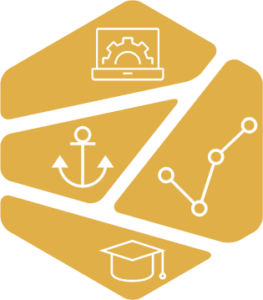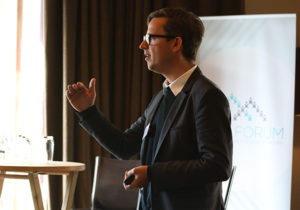Blockchain in the Energy sector – playing the angles in E-LAND
By Carsten Gydahl-Jensen, Communication, GECO Global 4. November 2019
 Many balls are in the air in E-LAND. Topics are discussed, and balls are caught according to main project targets and brought into streamlined motion. An asset in the tangible toolbox developed in E-LAND, will be business models. Business models will be developed and in this ball arena, blockchain is still a bouncing ball, difficult to get a grip on. The question is, can E-LAND be the ball game that can initiate further use of blockchain in the Energy sector?
Many balls are in the air in E-LAND. Topics are discussed, and balls are caught according to main project targets and brought into streamlined motion. An asset in the tangible toolbox developed in E-LAND, will be business models. Business models will be developed and in this ball arena, blockchain is still a bouncing ball, difficult to get a grip on. The question is, can E-LAND be the ball game that can initiate further use of blockchain in the Energy sector?

Prof. Dr Moritz Loock, Assistant Professor of Energy and Sustainability Management of the University of St. Gallen (Photo: Alps Forum 2019)
Prof. Dr Moritz Loock, Assistant Professor of Energy and Sustainability Management of the University of St. Gallen gives a try to get a grip on blockchain in the energy sector. He says: “E-LAND is a playground for developing business models and the blockchain technology is definitely an option. In the search for paths to walk to make profitable and fair business in the energy sector in the future, we need to keep our eyes open. Someday blockchain can be the technology that revolutionize the platform for energy trade-off”.
At the Alps Forum 2019 in St. Gallen, the potential of blockchain technology in the energy sector was to debate. E-LAND was presented, because the business model perspective is inherent in the E-Land project. Moritz Loock continues: “In E-LAND project we have to explore and during the project lifetime, further narrow our findings down to exploitation opportunities. We don’t aim at using blockchain in E-LAND, but we can play the angles and take advantage of knowledge bouncing our direction. In other words, we hope to be able to take advantage of results and take some results further, maybe to develop a new project aiming at exploiting the benefits of blockchain in the energy sector”.

According Moritz two alternative starting points are to be considered when evaluating the potential of a technology like blockchain:
- One starting point relates to the potential of the technology.
- Another starting point relates to actual energy market problems that need to be solved.
Further, Moritz suggested that it is advisable to consider potential alternatives of the blockchain technology. Hence, technologies that would alternatively be applicable and take into consideration how good these are.
“Discussing different problems in energy markets, we suggest that for the distribution and optimization of energy systems blockchain technology would be applicable with already existing use cases. Still today, alternative technologies often seem to be more advanced and better suitable. However, a potentially promising application could lie in guarantees of origin and different kinds of CO2 certificates”, Moritz concludes.
St. Gallen UniversityThe Institute for Economy and the Environment (IWOE-HSG) focuses on Sustainability Management and Renewable Energy Management. Founded in 1992, the IWOE-HSG was the 26th institute at the University of St.Gallen. oikos, an international student organization that promotes sustainable economics and management, and the oikos Foundation for Economy and Ecology, played a significant role in launching the institute. The institute is an interdisciplinary organization that seeks to make relevant, scientifically sound contributions to the economy and society. It also is focused on promoting the sustainable alignment of corporations and energy supplies. Moritz Loocks works in management heuristics and simple rules: e.g. utilize technology to provide services that are perceived valuable by customers (aspire customer value), decouple profit and growth from carbon emissions (innovate towards sustainability), organize value creation and capture based on a model in which different parts fit to each other in a meaningful way (engage in business modeling), etc.. |
||
Social media
E-LAND updates

The E-LAND project aims to develop and demonstrate tools for energy systems to overcome the technical, business, and societal challenges associated with the creation of… (1 year ago)

E-LAND exploitation enhancement activities kickstarted for the final project year Multiple events were executed and many more are planned for the E-LAND project’s final year.… (1 year ago)

A central pillar of the E-LAND project's is risk management. The Norwegian consortium member, Institute for Energy Technology (IFE), implemented a risk management approach to… (2 years ago)

E-LAND H2020 is working with creating a toolbox that is designed to optimize and control multi-energy islands and isolated communities. The toolbox is structured in… (2 years ago)

Smart Innovation Norway together with the University of St. Gallen have developed a series of workshops that began in June 2021 and focused on the… (2 years ago)

About the pilot site: Port of Borg is situated in an industrial area on a small peninsula called Øra just outside Fredrikstad, Norway. Port work… (2 years ago)

Since the mid-1960s, the township of Auroville in Southern India has been striving for sustainable living and the realization of human unity in diversity. In… (2 years ago)